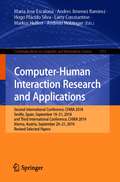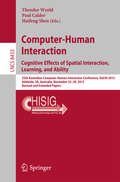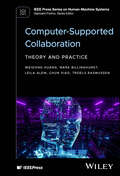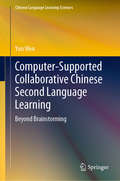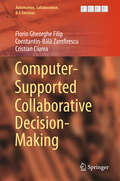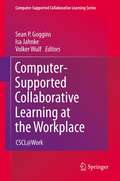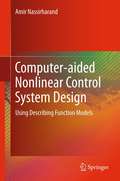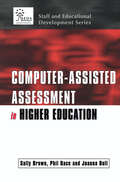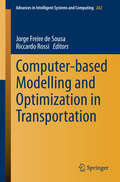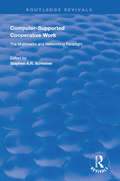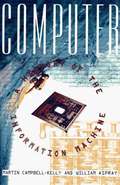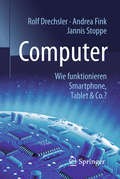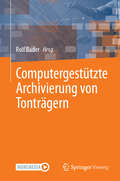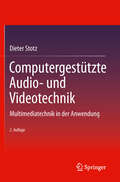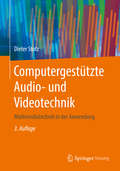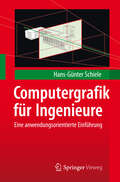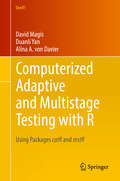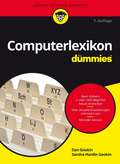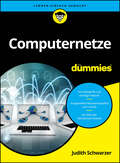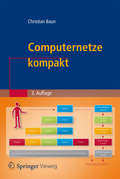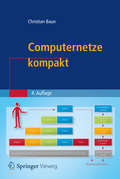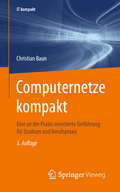- Table View
- List View
Computer-Human Interaction Research and Applications: Second International Conference, CHIRA 2018, Seville, Spain, September 19-21, 2018 and Third International Conference, CHIRA 2019, Vienna, Austria, September 20-21, 2019, Revised Selected Papers (Communications in Computer and Information Science #1351)
by Andreas Holzinger Markus Helfert Hugo Plácido Silva Maria Jose Escalona Andres Jimenez Ramirez Larry ConstantineThis book constitutes selected papers of the Second International Conference on Computer-Human Interaction Research and Applications, CHIRA 2018, held in Seville, Spain, in September 2018, and Third International Conference on Computer-Human Interaction Research and Applications, CHIRA 2019, held in Vienna, Austria, in September 2019.The 7 full papers presented in this book were carefully reviewed and selected from 28 submissions for CHIRA 2018 and 36 submissions for CHIRA 2019. The papers selected to be included in this book contribute to the understanding of relevant trends of current research on computer-human interaction, including Interaction design, human factors, entertainment, cognition, perception, user-friendly software and systems, pervasive technologies and interactive devices.
Computer-Human Interaction. Cognitive Effects of Spatial Interaction, Learning, and Ability: 25th Australian Computer-Human Interaction Conference, OzCHI 2013, Adelaide, SA, Australia, November 25-29, 2013. Revised and Extended Papers (Lecture Notes in Computer Science #8433)
by Theodor Wyeld Paul Calder Haifeng ShenThis book constitutes the thoroughly refereed post-conference proceedings of the 25th Australian Conference on Computer-Human Interaction, OzCHI 2013, held in Adelaide, SA, Australia, in November 2013. The 11 revised extended papers were carefully reviewed and selected from 192 submissions and cover topics on multi-dimensional interaction; video gaming; spatial learning; and physical spatial interaction.
Computer-Supported Collaboration: Theory and Practice (IEEE Press Series on Human-Machine Systems)
by Weidong Huang Leila Alem Mark Billinghurst Chun Xiao Troels RasmussenDiscover the latest developments in AR, VR, mobile, and wearable technologies for the remote guidance of physical tasks In Computer-Supported Collaboration: Theory and Practice, an expert team of researchers delivers the latest instruction in using augmented reality (AR), virtual reality (VR), and mobile or wearable technology to support remote guidance on physical tasks. The authors offer an overview of the field before moving on to discuss state-of-the-art research developments in everything from shared visual spaces to the use of hand gestures and gaze information for better collaboration. The book also describes the hardware devices, software tools, and libraries that can be used to help build remote guidance systems, as well as the industrial systems and applications that have been used in real world settings. Finally, Computer-Supported Collaboration includes a discussion of the current challenges faced by practitioners in the field and likely future directions for new research and development. Readers will also discover: A thorough introduction and review of the art of remote guidance research and engineering Comprehensive explorations of the shared visual space used to support common grounding and the remote guidance of physical tasks, as well as mobility support for local workers Practical discussions of mobility support of workers and helpers in remote guidance, including systems that support hands-free interaction In-depth explorations of communication cues in remote guidance, including systems that support gesturing and sketching on a touch-based display Perfect for researchers and professionals working in human-computer interaction or computer-supported collaborative work, Computer-Supported Collaboration: Theory and Practice is also an ideal resource for educators and graduate students teaching or studying in these fields.
Computer-Supported Collaborative Chinese Second Language Learning: Beyond Brainstorming (Chinese Language Learning Sciences)
by Yun WenThis book explores the implementation of an online representational tool, GroupScribbles, in Chinese-as-a-second-language classrooms from primary school to secondary school. It demonstrates the effectiveness of combining online representational tools with face-to-face classroom learning, and provides a workable approach to analysing interactions interweaving social and cognitive dimensions, which take place in the networked classroom. A series of suggestions regarding networked second language learning will help educators effectively implement information and communication technology tools in the classroom.
Computer-Supported Collaborative Decision-Making (Automation, Collaboration, & E-Services #4)
by Florin Gheorghe Filip Constantin-Bălă Zamfirescu Cristian CiureaThis is a book about how management and control decisions are made by persons who collaborate and possibly use the support of an information system. The decision is the result of human conscious activities aiming at choosing a course of action for attaining a certain objective (or a set of objectives). The act of collaboration implies that several entities who work together and share responsibilities to jointly plan, implement and evaluate a program of activities to achieve the common goals. The book is intended to present a balanced view of the domain to include both well-established concepts and a selection of new results in the domains of methods and key technologies. It is meant to answer several questions, such as: a) "How are evolving the business models towards the ever more collaborative schemes?"; b) "What is the role of the decision-maker in the new context?" c) "What are the basic attributes and trends in the domain of decision-supporting information systems?"; d) "Which are the basic methods to aggregate the individual preferences?" e)"What is the impact of modern information and communication technologies on the design and usage of decision support systems for groups of people?".
Computer-Supported Collaborative Learning at the Workplace: CSCL@Work (Computer-Supported Collaborative Learning Series #14)
by Volker Wulf Isa Jahnke Sean P. GogginsThis book is an edited volume of case studies exploring the uptake and use of computer supported collaborative learning in work settings. This book fills a significant gap in the literature. A number of existing works provide empirical research on collaborative work practices (Lave & Wenger, 1987; Davenport, 2005), the sharing of information at work (Brown & Duguid, 2000), and the development of communities of practice in workplace settings (Wenger, 1998). Others examine the munificent variation of information and communication technology use in the work place, including studies of informal social networks, formal information distribution and other socio-technical combinations found in work settings (Gibson & Cohen, 2003). Another significant thread of prior work is focused on computer supported collaborative learning, much of it investigating the application of computer support for learning in the context of traditional educational institutions, like public schools, private schools, colleges and tutoring organizations. Exciting new theories of how knowledge is constructed by groups (Stahl, 2006), how teachers contribute to collaborative learning (reference to another book in the series) and the application of socio-technical scripts for learning is explicated in book length works on CSCL. Book length empirical work on CSCW is widespread, and CSCL book length works are beginning to emerge with greater frequency. We distinguish CSCL at Work from prior books written under the aegis of training and development, or human resources more broadly. The book aims to fill a void between existing works in CSCW and CSCL, and will open with a chapter characterizing the emerging application of collaborative learning theories and practices to workplace learning. CSCL and CSCW research each make distinct and important contributions to the construction of collaborative workplace learning.
Computer-aided Nonlinear Control System Design: Using Describing Function Models
by Amir NassirharandA systematic computer-aided approach provides a versatile setting for the control engineer to overcome the complications of controller design for highly nonlinear systems. Computer-aided Nonlinear Control System Design provides such an approach based on the use of describing functions. The text deals with a large class of nonlinear systems without restrictions on the system order, the number of inputs and/or outputs or the number, type or arrangement of nonlinear terms. The strongly software-oriented methods detailed facilitate fulfillment of tight performance requirements and help the designer to think in purely nonlinear terms, avoiding the expedient of linearization which can impose substantial and unrealistic model limitations and drive up the cost of the final product. Design procedures are presented in a step-by-step algorithmic format each step being a functional unit with outputs that drive the other steps. This procedure may be easily implemented on a digital computer with example problems from mechatronic and aerospace design being used to demonstrate the techniques discussed. The author's commercial MATLAB®-based environment, available separately from insert URL here, can be used to create simulations showing the results of using the computer-aided control system design ideas characterized in the text. Academic researchers and graduate students studying nonlinear control systems and control engineers dealing with nonlinear plant, particularly mechatronic or aerospace systems will find Computer-aided Nonlinear Control System Design to be of great practical assistance adding to their toolbox of techniques for dealing with system nonlinearities. A basic knowledge of calculus, nonlinear analysis and software engineering will enable the reader to get the best from this book.
Computer-assisted Assessment of Students (SEDA Series)
by Phil Race Sally Brown Joanna BullThis text draws on a range of expertise to share good practice and explore new ways of using appropriate technologies in assessment. It provides a strategic overview along with pragmatic proposals for the use of computers in assessment.
Computer-based Modelling and Optimization in Transportation (Advances in Intelligent Systems and Computing #262)
by Jorge Freire Sousa Riccardo RossiThis volume brings together works resulting from research carried out by members of the EURO Working Group on Transportation (EWGT) and presented during meetings and workshops organized by the Group under the patronage of the Association of European Operational Research Societies in 2012 and 2013. The main targets of the EWGT include providing a forum to share research information and experience, encouraging joint research and the development of both theoretical methods and applications, and promoting cooperation among the many institutions and organizations which are leaders at national level in the field of transportation and logistics. The primary fields of interest concern operational research methods, mathematical models and computation algorithms, to solve and sustain solutions to problems mainly faced by public administrations, city authorities, public transport companies, service providers and logistic operators. Related areas of interest are: land use and transportation planning, traffic control and simulation models, traffic network equilibrium models, public transport planning and management, applications of combinatorial optimization, vehicle routing and scheduling, intelligent transport systems, logistics and freight transport, environment problems, transport safety, and impact evaluation methods. In this volume, attention focuses on the following topics of interest: · Decision-making and decision support · Energy and Environmental Impacts · Urban network design · Optimization and simulation · Traffic Modelling, Control and Network Traffic Management · Transportation Planning · Mobility, Accessibility and Travel Behavior · Vehicle Routing
Computer-supported Cooperative Work (Routledge Revivals)
by Stephen A.R. ScrivenerPublished in 1994, this work supplies an up-to-date view of Computer-Supported Cooperative Work (CSCW) and its role in empowering groups to achieve better solutions faster. The enabling technology and group organizational and behavioural aspects of CSCW should be of interest to a wide audience.
Computer: A History of the Information Machine
by Martin Campbell-Kelly William AsprayBlending strong narrative history and a fascinating look at the interface of business and technology, Computer: A History of the Information Machine traces the dramatic story of the invention of the computer. More than just the tale of a tool created by scientists to crunch numbers, this book suggests a richer story behind the computer's creation, one that shows how business and government were the first to explore the unlimited potential of the machine as an information processor. Not surprisingly, at the heart of the business story is IBM. A story of old-fashioned entrepreneurship in a symbiotic relationship with scientific know-how, it begins way back when "computers" were people who did the computational work of scientists, and Charles Babbage attempted in vain to mechanize the process. But it also shows how entrepreneurs like Herman Hollerith, seeing a business opportunity in a machine that could mechanically tabulate the U.S. census, created a punched-card tabulator that became the technology that created IBM. The authors show how ENIAC, the first fully electronic computer, emerged out of the wartime need of the military for computers that performed at lightning speed and did not need human intervention at any stage of the process. Most interesting is the story of how the computer began to reshape broad segments of our society when the PC enabled new modes of computing that liberated people from dependence on room-sized, enormously expensive mainframe computers. Filled with lively insights-many about the world of computing in the 1990s, such as the strategy behind Microsoft Windows-as well as a discussion of the rise and creation of the World Wide Web, here is a book no one who owns or uses a computer will want to miss.
Computer: Wie funktionieren Smartphone, Tablet & Co.? (Technik im Fokus #3005)
by Rolf Drechsler Andrea Fink Jannis StoppeComputer umgeben uns heute in fast allen Lebensbereichen. Sie erleichtern uns nicht nur als PC oder Laptop die Arbeit, sondern sind auch eingebettet in zahlreiche Objekte unseres t#65533;glichen Lebens - vom Auto bis zur Waschmaschine. Doch wie funktionieren moderne Rechner eigentlich? Und wie werden diese hochkomplexen, aus Milliarden Komponenten bestehenden Ger#65533;te entworfen? Das Buch erkl#65533;rt auf verst#65533;ndliche, informative und unterhaltsame Weise den Aufbau und die Funktionsweise heutiger Computersysteme. Einzelne inhaltliche Abschnitte werden durch Links zu Videos erg#65533;nzt, in denen Professor Rolf Drechsler relevante Themen pr#65533;gnant und pointiert vorstellt.
Computergestützte Archivierung von Tonträgern
by Rolf BaderDie Zukunft der Musikarchivierung und der Suchmaschinen liegt im Deep Learning und in Big Data. Algorithmen zum Abrufen von Musikinformationen analysieren automatisch musikalische Merkmale wie Klangfarbe, Melodie, Rhythmus oder musikalische Form, und künstliche Intelligenz sortiert und verknüpft diese Merkmale dann. Auf dem ersten International Symposium on Computational Ethnomusicological Archiving, das vom 9. bis 11. November 2017 am Institut für Systematische Musikwissenschaft in Hamburg stattfand, wurde ein neuer Standard für Computational Phonogram Archiving als interdisziplinärer Ansatz diskutiert. Ethnomusikologen, Musik- und Computerwissenschaftler, Systematische Musikwissenschaftler sowie Musikarchivare, Komponisten und Musiker stellten Werkzeuge, Methoden und Plattformen vor und tauschten Erfahrungen aus der Feldforschung und Archivierung in den Bereichen musikalische Akustik, Informatik, Musiktheorie sowie Musikspeicherung, -wiedergabe und Metadaten aus. Der Standard Computational Phonogram Archiving ist auch auf dem Musikmarkt als Suchmaschine für Musikkonsumenten sehr gefragt. Dieses Buch bietet einen umfassenden Überblick über das Gebiet, geschrieben von führenden Forschern aus aller Welt.
Computergestützte Audio- und Videotechnik: Multimediatechnik in der Anwendung
by Dieter StotzDiese Einführung in die moderne Audio- und Videotechnik ermöglicht Lesern mit technischem Grundverständnis einen leichten Einstieg - auch in komplexe Zusammenhänge. Der Autor vermittelt detailliertes Wissen, praxisnah und verständlich aufbereitet: von den Grundlagen der Ton- und Videotechnik über Abtastung und Digitalisierung, räumliches Hören, Datenkompression, MIDI-Standard und -Signale, digitale Audiomesstechnik bis zu hochauflösender Videotechnik, Genlock, Chromakeying, Schnittsystemen und Animation. Mit vielen Graphiken und Abbildungen.
Computergestützte Audio- und Videotechnik: Multimediatechnik in der Anwendung
by Dieter StotzDiese Einführung in die moderne Audio- und Videotechnik ermöglicht Lesern mit technischem Grundverständnis einen leichten Einstieg – auch in komplexe Zusammenhänge. Der Autor vermittelt detailliertes Wissen, praxisnah und verständlich aufbereitet: von den Grundlagen der Ton- und Videotechnik über Abtastung und Digitalisierung, räumliches Hören, Datenkompression, MIDI-Standard und -Signale, digitale Audiomesstechnik bis zu hochauflösender Videotechnik, Genlock, Chromakeying, Schnittsystemen und Animation. Mit vielen Graphiken und Abbildungen.
Computergrafik für Ingenieure: Eine anwendungsorientierte Einführung
by Hans-Günter SchieleZugeschnitten auf die Bedürfnisse von Ingenieuren, vermittelt der Autor in zwölf Kapiteln die Grundlagen der dreidimensionalen Computergrafik. Alle gängigen Projektionsarten, das Farbmanagement sowie diverse Verfahren zur Visualisierung werden behandelt. Die Kapitel bieten viele durchgerechnete Beispiele, inklusive der Ergebnisdarstellung. Die erforderlichen Mathematik-Kenntnisse gehen über Grundlagen der Matrizen-Rechnung und der Analytischen Geometrie nicht hinaus und sind in einem separaten Kapitel zusammengefasst.
Computerized Accounting Using Quickbooks Online: 2022 Update
by Jennifer Johnson Gayle WilliamsThis book is primarily intended for use in undergraduate accounting programs, although it could be used in business or computer information programs as well. It is expected that students taking this course have already successfully completed a course in financial accounting and have a firm understanding of the basic principles of accounting.
Computerized Accounting With Quickbooks 2018
by Gayle WilliamsWelcome to Computerized Accounting with QuickBooks 2018. I wrote this book to give students an introduction to QuickBooks that focuses not only on the soft¬ware mechanics, but also on the basic accounting concepts that underlie all ac¬counting systems. This book is not meant to be a user manual. It is meant to teach students how they can work with a computerized accounting system. It is my intention that students will come away from this book with an understanding that it is knowledge of the principles of accounting, not data-entry skills, that is needed to be successful in business.
Computerized Accounting with QuickBooks® Online 2020 Update
by Jennifer Johnson Gayle WilliamsWelcome to Computerized Accounting with QuickBooks Online. We wrote this book to give students an introduction to QuickBooks Online that focuses not only on the software mechanics, but also on the basic accounting concepts that underlie all accounting systems.
Computerized Adaptive and Multistage Testing with R: Using Packages catR and mstR (Use R!)
by Duanli Yan David Magis Alina A. von DavierThe goal of this guide and manual is to provide a practical and brief overview of the theory on computerized adaptive testing (CAT) and multistage testing (MST) and to illustrate the methodologies and applications using R open source language and several data examples. Implementation relies on the R packages catR and mstR that have been already or are being developed by the first author (with the team) and that include some of the newest research algorithms on the topic. The book covers many topics along with the R-code: the basics of R, theoretical overview of CAT and MST, CAT designs, CAT assembly methodologies, CAT simulations, catR package, CAT applications, MST designs, IRT-based MST methodologies, tree-based MST methodologies, mstR package, and MST applications. CAT has been used in many large-scale assessments over recent decades, and MST has become very popular in recent years. R open source language also has become one of the most useful tools for applications in almost all fields, including business and education. Though very useful and popular, R is a difficult language to learn, with a steep learning curve. Given the obvious need for but with the complex implementation of CAT and MST, it is very difficult for users to simulate or implement CAT and MST. Until this manual, there has been no book for users to design and use CAT and MST easily and without expense; i. e. , by using the free R software. All examples and illustrations are generated using predefined scripts in R language, available for free download from the book's website.
Computerlexikon für Dummies (Für Dummies)
by Dan Gookin Sandra Hardin GookinKennen Sie das? Sie unterhalten sich mit einem Fachmann über Computer oder Smartphones und verstehen nur Bahnhof? In "Computerlexikon für Dummies" finden Sie über 2500 Begriffe aus der Computerwelt, leicht verständlich erklärt und auf den Punkt gebracht, von A wie Abbrechen über M wie Multitouch bis zu Z wie Zylinder (eines Festplattenlaufwerks). Die 7., überarbeitete und aktualisierte Auflage enthält zudem viele neue Begriffe, die die Entwicklung der letzten Jahre mit sich gebracht hat - zum Beispiel zum Datenschutz, zu Windows 10 und zu Trends wie Pokemon Go und Fitness Tracker.
Computernetze für Dummies (Für Dummies)
by Judith SchwarzerWas sich Computer so zu erzählen haben und wer da sonst noch mitredet Computernetzwerke sind grundlegend für die digitale Kommunikation und die gemeinsame Nutzung von Ressourcen in einem Datennetzwerk. Wie ein Computernetzwerk aufgebaut ist, wie es funktioniert und welche Modelle und Regelwerke dem zugrunde liegen, erfahren Sie in diesem Buch. Die Autorin erläutert unter anderem bekannte Anwendungen des Internets mit wichtigen Kommunikationsabläufen gängiger Netzwerkprotokolle, wie IP, TCP, Ethernet und WLAN. Das Buch vermittelt ein tiefgreifendes Verständnis der wichtigsten Netzwerkabläufe und macht Sie fit für die Internet-Technologien der Zukunft. Sie erfahren Wie die wichtigsten Netzwerkprotokolle und -komponenten zusammenspielen Wie das Internet-Protokoll in der Version 4 und 6 funktioniert Wie aus IP-Paketen physikalische Übertragungssignale werden Was Netzwerke sicher, zuverlässig und mobil macht
Computernetze kompakt (IT kompakt)
by Christian BaunDas Werk bietet einen umfassenden Überblick über Computernetzwerke und die wichtigsten Technologien. Der Autor orientiert sich dabei am Schichtenmodell der Internationalen Organisation für Normung und behandelt für jede Schicht die jeweiligen Geräte und Protokolle. Dazu zählen auch Netzwerktechnologien wie z. B. Ethernet, WLAN, Bluetooth sowie Übertragungsmedien. Das Werk vermittelt Lesern ein fundiertes Verständnis von Computernetzwerken - in kompakter Form und in klaren Zusammenhängen.
Computernetze kompakt (IT kompakt)
by Christian BaunComputernetzwerke ermöglichen die Kommunikation der darin zusammengeschlossenen Systeme untereinander. Das Buch vermittelt grundlegendes Wissen über die Funktionsweise moderner Computernetze und deren verschiedenen Komponenten.Ausgehend von einführenden Kapiteln zur Informationstechnik (IT) und zur Computervernetzung erläutert der Autor zunächst die Grundlagen von Protokollen und deren Einordnung in etablierte Referenzmodelle. In diesem Kapitel wird außerdem der Ablauf der Kommunikation im Computernetzwerk und der Weg beschrieben, den die Nutzdaten durch die einzelnen Protokollschichten nehmen. Den einzelnen Schichten der Netzarchitektur, von der untersten Schicht, der Bitübertragungsschicht, bis zur obersten Schicht, der Anwendungsschicht, sind dann die folgenden fünf Kapitel gewidmet. Zu den behandelten Protokollen gehören Netzwerktechnologien wie Ethernet, WLAN, Bluetooth sowie die jeweiligen Übertragungsmedien. Ein eigenes Kapitel führt in die Netzwerkvirtualisierung mit VPNs und VLAN ein. Am Schluss des Buchs finden Leser eine Übersicht über die wichtigsten Kommandozeilenwerkzeuge, die benötigt werden, um Netzwerke zu konfigurieren und Netzwerkprobleme zu analysieren.Das Buch erscheint in der Reihe „IT kompakt“. Diese Werke zu wichtigen Konzepten und Technologien der IT-Branche zeichnen sich dadurch aus, dass sie die Themen fundiert und zugleich praxisorientierten darstellen. Ziel des Buches ist daher eine an der Realität orientierte Beschreibung von Computernetzwerken, die die wichtigsten Technologien in einem klaren Zusammenhang und anhand von aussagekräftigen Beispielen und vielen Abbildungen behandelt. Die vierte Auflage wurde durchgängig aktualisiert und korrigiert. Neu hinzugekommen sind unter anderem Abschnitte zu den Themen IPv6 und HTTP/2.
Computernetze kompakt: Eine an der Praxis orientierte Einführung für Studium und Berufspraxis (IT kompakt)
by Christian BaunDas Werk bietet einen kompakten Überblick über das Thema Computernetzwerke. Sein Aufbau orientiert sich an den Schichten der etablierten Referenzmodelle und behandelt für jede Schicht die Geräte, Nachrichtenformate, Art und Weise der Adressierung und die wichtigsten Protokolle. Zu den Protokollen gehören auch Netzwerktechnologien wie Ethernet, WLAN (WiFi), Bluetooth usw. und die Übertragungsmedien. Ziel des Buches ist keine Auflistung von Algorithmen, sondern eine an der Realität orientierte Beschreibung, die die wichtigsten Technologien in einem klaren Zusammenhang behandelt. Das Buch vermittelt dem Leser ein fundiertes Verständnis von Computernetzwerken in kompakter Form anhand vieler aussagekräftiger Beispiele und Abbildungen. Die fünfte Auflage wurde durchgängig aktualisiert und korrigiert.
